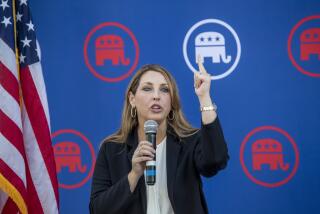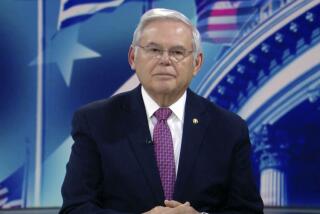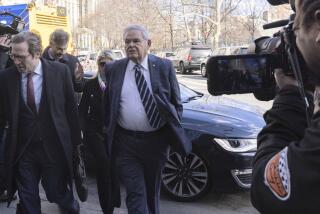Chris Christie scandal: Is saying ‘I’m sorry’ going to be enough?
From bombastic, take-no-prisoners Chris Christie came something new Thursday, in an exhaustive news conference called to blunt a New Jersey scandal that has threatened his standing as a 2016 Republican presidential front-runner.
A profession of humility.
The governor was heartbroken, blindsided and sad, he said. Christie had been intensely loyal to aides and they had betrayed him with dishonesty. He had canned two of them, and threw another one, who had already resigned, forcefully under the bus.
But Christie also repeatedly took responsibility for his aides’ decision to tie up traffic on roads leading to the George Washington Bridge last September in pursuit of political retribution against a Democratic mayor who had not endorsed Christie in his laugher of a 2013 reelection bid.
“I had no knowledge or involvement in this issue, in its planning or its execution, and I am stunned by the abject stupidity that was shown here,” Christie said in a discussion that stretched to nearly two hours. He added: “But that doesn’t matter; I am ultimately responsible.”
READ: Controversial Christie staffer emails
As a theatrical performance, Christie’s appearance was close to a tour de force: The governor kept his cool and patience and repeatedly apologized, not things he is usually known to do, though he veered perhaps too close to characterizing himself as a victim rather than focusing on those more directly affected. He appeared in command of the situation, though of course it was a situation he acknowledged he had not sufficiently been atop for the last several months. The entire state fell under the umbrella of his apology.
“I come out here today to apologize to the people of New Jersey,” he said seconds into his appearance. “I apologize to the people of Fort Lee”, the community where traffic snarled and whose mayor, Mark Sokolich, was the intended target of the chaos, according to emails released Wednesday showing conversations among Christie’s key aides.
Christie’s effort was meant to stop the spread of a story that has delighted the area’s tabloids, distressed commuters caught in the huge backups and raised questions about whether the actions led to the death of a 91-year-old woman who was among those caught in the jam. (Authorities have noted that paramedics were delayed in reaching her, but they have not specifically blamed the death on the actions of the governor’s team.)
The controversy would have been limited to New York and New Jersey, neighbors served by the George Washington Bridge, but for the looming 2016 presidential campaign. On the strength of his blowout reelection victory, Christie vaulted to the top of the prospective GOP candidate heap, and his new position as head of the nation’s Republican Governors’ Assn. ensures that he will be front and center in key electoral states until he makes a formal decision about whether to run.
Though Christie appeared to have stemmed the bloodletting Thursday, the full impact of the controversy rests on whether anything comes next.
“He squarely accepted it. ... He was contrite, without being weak,” said Tom Rath, a longtime GOP activist in New Hampshire, which hosts the first presidential primary. After watching Christie’s marathon news conference, Rath suggested that the controversy would ultimately blow over “as long as this stays at this level of information [and] as long as he doesn’t get any closer to it.”
PHOTOS: Scenes from “Bridgegate”
If proof arises to contradict Christie’s contention that he knew nothing of his aides’ actions until reading about the emails on a news website Wednesday -- he said that last month he had asked aides to come forward if they had done anything wrong, and none did -- the impact could be devastating to his White House ambitions.
Even absent any personal involvement by Christie, the bridge issue is rife with danger for his political future in that it could play on preexisting concerns about his demeanor, which critics have characterized as bullying.
Christie’s political power has been built on his blunt personality and the explicit assertion that he was not a politician. The emails by his aides were political in the extreme, filled with mockery for the mayor who declined to endorse Christie and a willingness to punish New Jersey residents for the official’s perceived sins. (The fact that Christie’s team was arraying its power against a Democrat also cuts into Christie’s argument that he, almost alone among Republicans thought to be vying for the presidency, is willing to work across the aisle.)
Several questions about the traffic controversy remained after Christie’s appearance.
If Christie’s campaign team hadn’t even solicited the endorsement of the Fort Lee mayor, as Christie asserted in explaining why he didn’t believe the issue to be political until the emails emerged, then why were the mayor and the city punished?
Even if Christie couldn’t keep tabs on 65,000 state employees, as he claimed in his defense, why didn’t he know what his key aides were doing? (His deputy chief of staff was fired on Thursday; on Wednesday night, his campaign manager was kicked off the governor’s political team; both were part of the email stream.)
And even if he did not know what was going on -- not a great argument for a manager -- did Christie encourage a culture of retribution and sharp elbows that would haunt him as a presidential candidate?
The governor took pains Thursday to cast the incident as an anomaly, as if he was telling voters who might be looking at his presidential prospects to just move along and trust that he’s got it under control.
Even as he continued to speak, his team emailed out two video clips of Christie.
“I am heartbroken and I’m sorry,” the first was titled. It was followed swiftly by a second sentiment: “This is the exception, not the rule.”
Follow Politics Now on Twitter and Facebook
Twitter: @cathleendecker
More to Read
Get the L.A. Times Politics newsletter
Deeply reported insights into legislation, politics and policy from Sacramento, Washington and beyond. In your inbox three times per week.
You may occasionally receive promotional content from the Los Angeles Times.






